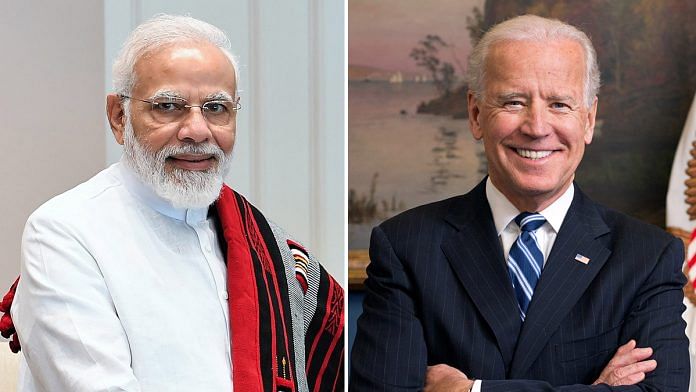New Delhi: Prime Minister Narendra Modi and US President Joe Biden may have reaffirmed commitment to strengthening the Indo-Pacific framework in their first conversation since the latter’s swearing-in, but their differences over Quad, “democratic values” and the upheaval in Myanmar were starkly evident.
Modi and Biden last spoke in November 2020 after the US Presidential election results were announced.
According to a statement issued by the White House after the call, both the leaders agreed to continue with the joint collaboration and cooperation “to promote a free and open Indo-Pacific” as well as “stronger regional architecture through the Quad”.
The Indian statement, however, did not mention Quad. It stated Modi and Biden expressed commitment to “working with like-minded countries to ensure a rules-based international order and a free, open and inclusive Indo-Pacific region”.
Official sources said India is yet to take a call on to what level it would like to take the Quad grouping within the Indo-Pacific framework even as tensions between New Delhi and Beijing have been brewing at the Line of Actual Control in Ladakh for over eight months now.
India didn’t mention Quad even after the conversation between US Secretary of State Antony J. Blinken and External Affairs Minister S. Jaishankar on 29 January.
While the US statement said that Blinken underlined “the importance of working together to expand regional cooperation, including through the Quad”, the MEA statement skipped it.
The US, Australia, India and Japan are members of the ‘Quad’ or the Quadrilateral Security Dialogue, which was proposed by former Japan PM Shinzo Abe to check China’s growing influence and assertiveness in the Indo-Pacific region. It is an informal strategic grouping within the Indo-Pacific framework.
Biden has already spoken to Japanese Prime Minister Yoshihide Suga and Australian PM Scott Morrison, and discussions on China along with regional security issues were prominently mentioned in the readouts.
With PM Suga, President Biden even discussed the US’ “unwavering commitment” to support Japan in its struggle with China in the South China Sea over the Senkaku Islands.
Also read: Biden administration urges Modi govt to resolve farmer protests through dialogue
‘Scope and dimensions of Quad are still a work in progress’
Experts said India may still be deciding on the level of its commitment to the Quad.
“Significantly, for all the wariness on whether the Biden administration will continue with the Quad or not, it is the Indian side that did not mention the Quad in the readout. The White House readout, on the other hand, was categorical that the two countries will continue their close cooperation on free and open Indo-Pacific and a stronger architecture through Quad,” said Rajeshwari Pillai Rajagopalan, Distinguished Fellow and Head (nuclear and space policy initiative), Observer Research Foundation.
“The Quad leaders are also planning a meeting at the earliest, but it appears that India may still be deciding on the level of its commitment to the Quad,” Rajagopalan added.
Meera Shankar, former Indian ambassador to the US, told ThePrint, “The scope and dimensions of the Quad are still a work in progress as each of the four Quad members has their own concerns about their equations with China. So where the balance will be struck is still being defined.
“The importance of an international rules-based order in the Info Pacific and the desire to consolidate and strengthen the Indo-US Strategic Partnership speak to the growing convergence of strategic concerns and interests in this region,” Shankar added.
“There is a need to build trust with President Biden and his team working together on our shared interests and discussing candidly issues where our perceptions may vary.”
Differences on democratic values and Myanmar
The conversation between Biden and Modi also comes at a time when voices from the US have been growing louder on issues concerning the right to protest by the farmers as well as curbing internet freedom, among others.
Earlier this month, the US State Department stated “peaceful protests are a hallmark of any thriving democracy and note that the Indian Supreme Court has stated the same”.
Aparna Pande, Director, Initiative on the Future of India and South Asia, Hudson Institute, said, “The strategic partnership will remain strong especially with the US-China peer rivalry. But challenges will remain on the economic and the value-based issues and democratic fronts…”
“The key difference was on the issue of democratic values. The Indian readout referred to a ‘shared commitment to democratic values’, but the American readout stated that the President underscored his desire to defend democratic institutions,” she said.
Yet another notable difference seen in both the readouts was concerning Myanmar, which witnessed a military coup earlier this month.
While the White House statement said “rule of law and democratic process must be upheld” in Myanmar, the MEA statement did not mention Myanmar.
The MEA statement also didn’t mention the issue of terrorism.
“Predictably, the readout from the Indian side chose to avoid references to any country by name, namely Burma. But what was also interesting was the readout did not make any mention of terrorism either,” Pande said.
Also read: Like Joe Biden, PM Modi should’ve taken Covid vaccine on first day, says Congress leader




Was it outgoing, or incoming …
On other issues, India and the United States can have differences. However, not democracy.